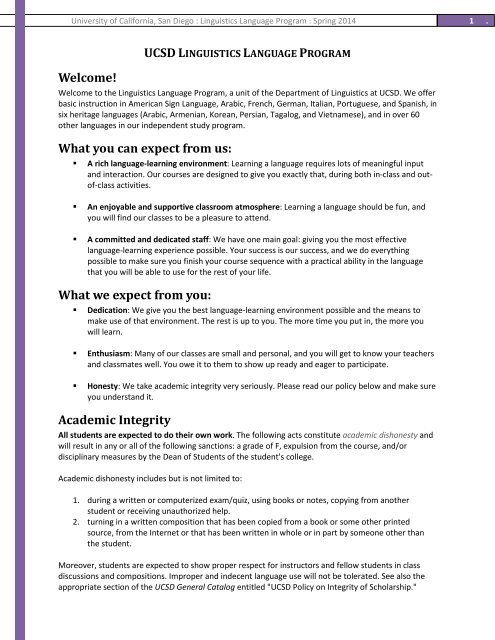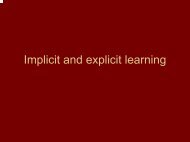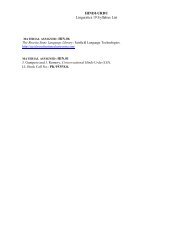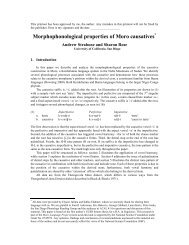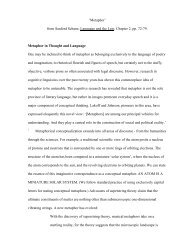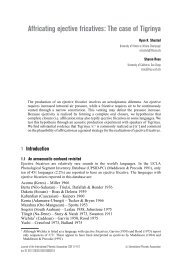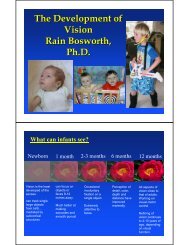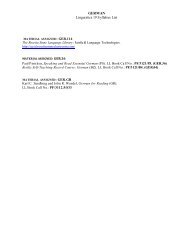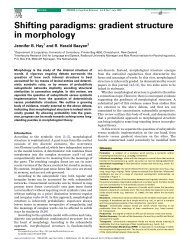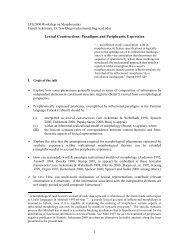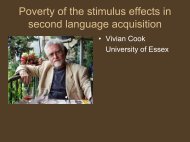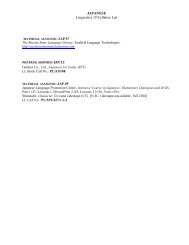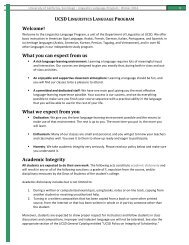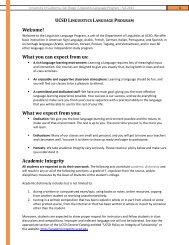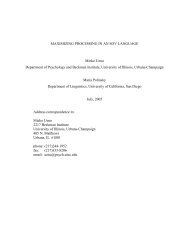1C/CX - Linguistics
1C/CX - Linguistics
1C/CX - Linguistics
- No tags were found...
You also want an ePaper? Increase the reach of your titles
YUMPU automatically turns print PDFs into web optimized ePapers that Google loves.
University of California, San Diego : <strong>Linguistics</strong> Language Program : Spring 20141 .Welcome!UCSD LINGUISTICS LANGUAGE PROGRAMWelcome to the <strong>Linguistics</strong> Language Program, a unit of the Department of <strong>Linguistics</strong> at UCSD. We offerbasic instruction in American Sign Language, Arabic, French, German, Italian, Portuguese, and Spanish, insix heritage languages (Arabic, Armenian, Korean, Persian, Tagalog, and Vietnamese), and in over 60other languages in our independent study program.What you can expect from us:• A rich language-learning environment: Learning a language requires lots of meaningful inputand interaction. Our courses are designed to give you exactly that, during both in-class and outof-classactivities.• An enjoyable and supportive classroom atmosphere: Learning a language should be fun, andyou will find our classes to be a pleasure to attend.• A committed and dedicated staff: We have one main goal: giving you the most effectivelanguage-learning experience possible. Your success is our success, and we do everythingpossible to make sure you finish your course sequence with a practical ability in the languagethat you will be able to use for the rest of your life.What we expect from you:• Dedication: We give you the best language-learning environment possible and the means tomake use of that environment. The rest is up to you. The more time you put in, the more youwill learn.• Enthusiasm: Many of our classes are small and personal, and you will get to know your teachersand classmates well. You owe it to them to show up ready and eager to participate.• Honesty: We take academic integrity very seriously. Please read our policy below and make sureyou understand it.Academic IntegrityAll students are expected to do their own work. The following acts constitute academic dishonesty andwill result in any or all of the following sanctions: a grade of F, expulsion from the course, and/ordisciplinary measures by the Dean of Students of the student's college.Academic dishonesty includes but is not limited to:1. during a written or computerized exam/quiz, using books or notes, copying from anotherstudent or receiving unauthorized help.2. turning in a written composition that has been copied from a book or some other printedsource, from the Internet or that has been written in whole or in part by someone other thanthe student.Moreover, students are expected to show proper respect for instructors and fellow students in classdiscussions and compositions. Improper and indecent language use will not be tolerated. See also theappropriate section of the UCSD General Catalog entitled "UCSD Policy on Integrity of Scholarship."
University of California, San Diego : <strong>Linguistics</strong> Language Program : Spring 20142 .Course goalsThe Conversation and Analysis sections are two halves of one course and need to be taken together.Both are designed to immerse you in the language and give you a practical ability as quickly as possible.The two halves are together worth 5 units, so you should expect a heavier workload than a typical 4-unitclass.• Conversation (MWF) is a smaller class, with special attention to ASL vocabulary developmentand Deaf cultural knowledge.• Analysis (TuTh) is a larger class, with special attention to the grammar ASL, viewing DVDs, andlearning how to analyze the language and the culture.AttendanceA maximum of three absences in the Conversation classes and two absences in the Analysis section willbe tolerated. Each further absence in a section will lower by one level your grade in that section. Forexample, one additional absence will lower a B+ to a B or a C to a C-. Three late arrivals in aConversation section or two late arrivals in an Analysis section will count as one absence. If you miss 2weeks or more of class for any reason, you are encouraged to drop the course; otherwise, you are at riskof failing.If you are absent and miss a quiz or an exam, see your Tutor or GA immediately to determine if the workcan be made up. An approved make-up must be completed within one week. A missed quiz or exammay be made up at the discretion of the instructor, but the absence cannot be made up.Enrollment and PlacementOnly if you have never studied or been exposed to ASL, will you be permitted to enroll in and get creditfor ASL 1A/1AX. If you have had any previous experience in the language (such as previous course workin high school or college, or exposure at home), you must make an appointment with Peggy Lott, theAcademic Coordinator for ASL (plott@ling.ucsd.edu) to place you at the appropriate level of ASL.A student who fails one half of the course must retake that half before continuing on to the next level ofthe sequence. In order to enroll in the next level, you must have completed the Conversationcomponent of the course of the previous level with a grade of "C-" or better and the Analysiscomponent of the course of the previous level with a grade of "D" or better. A student who receives aConversation component grade of "C-" or better but who receives a "D" in the Analysis component maydo one of two things: Either 1) retake the Analysis component before going on to the next level, or 2) goon to the next level. However, a student may not complete the next level and subsequently retake a "D"grade. (A student who receives a "P" grade in the Conversation component and "NP" in the Analysiscomponent may not continue to the next level.)Other useful informationLLP web site: http://ling.ucsd.edu/Language/llp.htmHappy language learning!Grant GoodallProfessor of <strong>Linguistics</strong>Director, <strong>Linguistics</strong> Language Program
University of California, San Diego : <strong>Linguistics</strong> Language Program : Spring 20143 .ASL <strong>1C</strong>/<strong>CX</strong>Materials• Texts: Humphries and Padden, Learning American Sign Language, 2nd EditionSmith, Lentz and Mikos, Signing Naturally Workbook, Level 1 (available inLanguage Lab – only one unit is required for ASL <strong>1C</strong>/<strong>CX</strong>)Smith, Lentz and Mikos, Signing Naturally Workbook, Level 2• Reading: Bragg, L., editor, Deaf World, A Historical Reader and Primary SourcebookPadden and Humphries, Deaf in America: Voices from a Culture• DVD/Video: Learning American Sign Language, 2nd Edition (purchase with text)Signing Naturally Student Videotext, Level 1 (available in Lab)Signing Naturally Student Videotext, Level 2 (purchase with workbook)ASL at Work DVD (available in Language Lab; no purchase required)Patrie, Fingerspelled Names and Introductions: A Template Building Approach(available in the Language Lab; no purchase required)Additional required materials are posted online at https://lang.ucsd.edu/llp/index.html (select“Download Course Materials”) and additional vocabulary viewing is available online athttp://lang.ucsd.edu/asl/1c/ (see your Instructor for the User Name and Password).Grading• Conversation: 35% Final oral15% Video comprehension quizzes20% Class participation30% Other: vocabulary quizzes, culture quizzes and homeworkNOTE: If you receive a D or F on the final oral, this will be your grade forConversation, regardless of your scores in other components of thecourse. Final exams will be scheduled by appointment during FinalsWeek (and may not be taken earlier).• Analysis: 50% Final exam30% Midterm20% Homework and participationClass RulesNOTE: Final Exams will be offered during Finals Week. You can checkthe date of your final by going to TritonLink and searching underCalendars/Academic.Please show respect for your instructors and your fellow students by adhering to a few simple rules. Inthe ASL classrooms, there will be no eating, no use of phones, no student use of laptops/tablets, and nouse of voice communication. Please arrive to class on time and use visual communication (ASL,gestures, or writing) at all times.
University of California, San Diego : <strong>Linguistics</strong> Language Program : Spring 20144 .Conversation <strong>1C</strong> (M-W-F)WeekPrimaryText/DVDLearning ASL(due Monday)1 Unit 17Culture Readings:DW, D in A, LASL, SN(due Wednesday)DW: Ch 21 & 27LASL: p. 235CQ2 Unit 18 DW: Ch 39 & 463 Unit 194 Unit 205 Review6 Unit 217 Unit 228 Unit 23*9Unit 24HOLIDAYDW: Ch 23 & 42SN 2: p. 130CQD in A: Ch 6(NOTE: Not DW)DW: Ch 48CQDW: Ch 32, 34 & 36LASL: p. 50DW: Ch 44, 47 & 53LASL: p.306SN 2: p. 44CQDW: Ch 43, 51 & 52SN 2: p. 64DW: Ch 30 & 3<strong>1C</strong>QASL at Work(due Friday)(no assignment)Unit 10SED only(not CP, not EPP)Unit 10EPP only(not SED, not CP)Unit 14SED, CP & EPP(no assignment)Unit 11SED, CP & EPPUnit 12SED, CP & EPPUnit 10CP only(not SED, not EPP)Unit 16SED & EPP only(not CP)Fingerspelling(due Friday)Signers 1-4FS HW due(download fromCourse Materials)(no FS assignment)VQSigners 5-8VQ(no FS assignment)VQSigners 9-12FS HW dueVQ/VidQ(no FS assignment)VQ(no FS assignment)VQSigners 13-16VQSigners 17-21VQ10 ReviewDW: Ch 49SN 2: p.147-149Unit 16CP only(not SED, not EPP)Notes:CQ = Culture Quiz (Weeks 1, 3, 5, 7, 9 -- covers all culture readings since the previous quiz)VQ = Vocabulary Quiz (Friday of Weeks 2 through 9 – vocab from LASL, SN, ITA)VidQ = Video Quiz (Weeks 5 and 10)SED = Sample Expressive Dialogue (a part of ASL at Work DVD)CP = Comprehension Practice (a part of ASL at Work DVD)EPP = Expressive Practice Prompts (a part of ASL at Work DVD)* Holiday: Monday of week 9(no FS assignment)VidQ
University of California, San Diego : <strong>Linguistics</strong> Language Program : Spring 20145 .Details about the Conversation Section• Vocabulary: Vocabulary development is the basis for understanding and using a language. Youare responsible for learning the vocabulary introduced in class as well as in all books andvideo/DVD assignments. LASL and SN vocabulary are given in your book. You should downloadthe ASL at Work (AAW) vocabulary lists from the LLP Course Materials web site the first week ofclass (https://lang.ucsd.edu/llp/index.html). Please use these lists as you view the AAWvocabulary videos online. Your Friday vocabulary quizzes may contain items from any of thethree course text/DVDs: LASL, SN, or AAW. To support your acquisition of the AAW vocabulary,view the online videos at http://lang.ucsd.edu/asl/1c/ Your instructor will give you the UserName and Password needed to access the AAW vocabulary videos. NOTE: you are alsoresponsible for homework assignments based on the ASL at Work DVD viewings due on Fridays.• Culture Readings: The purpose of the reading assignments is to familiarize you with issues ofethnicity and daily life within Deaf communities. You should download the “Culture StudyQuestions” from the LLP Course Materials web site the first week of class(https://lang.ucsd.edu/llp/index.html). Please use the study questions to guide your reading.Come to class each Wednesday having read the assignments (DW, D in A, LASL, SN) and beprepared to discuss important concepts in ASL. Culture quizzes (given Wednesday of weeks 1, 3,5 , 7 and 9) consist of approximately 5 multiple choice or T/F questions. If you have read theassignments and participated actively in class discussions, you should have no problemanswering the questions on the culture quizzes.• Fingerspelling: The purpose of the fingerspelling assignments is to increase your ability tounderstand and use the American Manual Alphabet. View the assignments and make notesabout the important concepts included in each lesson. Your Instructor will usually do somefingerspelling activities in class on Friday and may include some fingerspelling on the Fridayvocabulary quizzes.• Video/DVDs: Your ability to understand ASL will increase with exposure to the LASL, SN andAAW DVDs assigned. You should view the LASL DVD dialogues and key structures for each unitbefore coming to class on Monday. View the SN and AAW units assigned before class on Friday.Note that you must download the vocabulary lists and assignments based on AAW and turn inhomework on Fridays as assigned. If you have problems understanding the DVDs, write downyour questions and ask your Tutor in class. SN videos contain a variety of activities (thesupporting workbook assignments are due each Thursday in ASL 1AX) that will enhance yourcomprehension of ASL. AAW dialogue videos (available in the lab, not for purchase) offerdialogues to give you even more practice at ASL comprehension. The vocabulary used in theAAW dialogues will be taught on Mondays in class.• Video Comprehension Quizzes: On Fridays of week 5 and 10, you will take a video quiz coveringa selection of dialogues from the video assignments you have viewed. During the quiz, you willview some of the previous video assignments and answer multiple choice or T/F questions aboutthe information given in the dialogues.• Conversation Final: An individual fifteen minute conversation with your Instructor. YourInstructor will bring a sign-up sheet to class during week 9 or 10. Your conversation finalappointment will be during finals week and cannot be taken earlier.
University of California, San Diego : <strong>Linguistics</strong> Language Program : Spring 2014Analysis <strong>1C</strong>X (Tu-Th)6 .Week Due Tuesday Due Thursday Page Numbers1 Study LASL Unit 172 Study LASL Unit 183 Study LASL Unit 19Attrition (type 5 suggestionsto avoid attrition of ASL skills)SN 2: Unit 17, up to p.122Places to See in SeattleThe Signing WeekendBeginning ConversationsSN 2: Unit 17, p. 122 to endDisrupted PlansNumber PracticeDescriptionary: A Game ShowLiving in the Hearing WorldStory Corner: Ethics ***(download from CourseMaterials web site)p. 117p. 120p. 121-122p. 122-124p. 125p. 126-127p. 128p. 1294 Study LASL Unit 20 Video Homework Assignment5Review LASL Units 17-20SN 2, Unit 176 Study LASL Unit 217 Study LASL Unit 228 Study LASL Unit 239 Study LASL Unit 2410 Review LASL Units 17-24Midterm Exam(no homework due)SN 1: Unit 10( SN 1 is available in Lab)Talking about ChildrenA Show of HandsFingerspelling,Part 4SN 2: Unit 14, p.42 to endClock Numbers PracticeCommon FS WordsThe Fortune TellerStory Corner: Final Exam ***Cheers and SongsSN 2: Unit 15, up to p. 65Discussing NationalitiesCinnie’s AutobiographyTelling Unexpected ChangesSN 2: Unit 16, up to p. 97Have Clock, Will TravelDescribing ObjectsPicture ItPotpourriSN 2: CR 13-17Which Number Was That?Story Corner: We Got Plentyof Them Back Home ****** For each Story Corner assigned, TYPE a full, detailed story for your homework assignmentp. 50pp. 50-51p. 51p. 42p. 43p. 43p. 44p. 44p. 59p.62-63p. 65p. 88p. 93-94p. 95p. 96-97p. 150p. 152
University of California, San Diego : <strong>Linguistics</strong> Language Program : Spring 20147 .Analysis <strong>1C</strong>X (Tu-Th)DetailsYou are responsible for studying the grammar points in the assigned LASL unit prior to class on Tuesdayand the grammar points in the assigned SN unit prior to class on Thursday. Do the workbook assignmentfor the SN unit and bring it to class with you on Thursday (Note: Week 1 requires you to download thetopic “Attrition” from LLP Course Materials (https://lang.ucsd.edu/llp/index.html). For the SNhomework assignments, you can either TYPE your answers on a separate piece of paper or photocopythe pages of your book where you have written the answers. You will soon find that the answers aregiven in the back of the book. Please check your own work and turn it in showing the errors you havemade with corrections in a different color ink. You will not be graded down for your errors. If you havecompleted the entire assignment and turned it in on time, you will receive full credit for the homework.These assignments are essential to prepare you for the midterm and final exam. If you fail to do them,you will not be ready for the exams.Extra CreditIf you wish to earn extra credit for your ASL course, you have the option of completing one assignmentfor ASL <strong>1C</strong> and one for ASL <strong>1C</strong>X. To earn extra credit, you may attend an ASL event approved by yourInstructor and turn in a typed one-page summary of what you learned while there. The goal of thisassignment is to give you experience interacting and observing ASL signers in the local Deaf community.Your extra credit points will be added to your participation and/or your homework scores at the end ofthe quarter.Language Studies/ASL MinorHave you considered a minor in Language Studies/ASL? This <strong>Linguistics</strong> Department minor requiresseven courses, five of which must be upper division. If you are interested in learning more about theminor, please email the Academic Coordinator for ASL, Peggy Lott, plott@ucsd.edu, for moreinformation.


